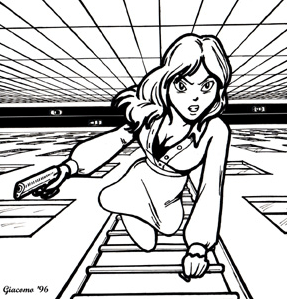 Much ink, both virtual and real, has been spilled on the subject of how important it is for a GM, in his limitless power, not to break the rules laid down by the books of his given game. He must (it is often said) stand apart as an impartial arbiter, and let the dice fall where they may. I cannot entirely agree with that point of view, but I'm not here to argue against it, either. What I am here to do is discuss the sadly neglected other set of rules -- the rules of narrative -- which to my mind are at least as important to a game master.
Much ink, both virtual and real, has been spilled on the subject of how important it is for a GM, in his limitless power, not to break the rules laid down by the books of his given game. He must (it is often said) stand apart as an impartial arbiter, and let the dice fall where they may. I cannot entirely agree with that point of view, but I'm not here to argue against it, either. What I am here to do is discuss the sadly neglected other set of rules -- the rules of narrative -- which to my mind are at least as important to a game master.
The rules of narrative are not something written down in any game-book's contract of how play shall proceed -- at least not in any game book that I've ever seen. Rather, they're things etched into human nature by the way we think in stories. Yes, you can run an RPG without any conscious regard for the rules of narrative, but it perilously increases your chances of becoming the subject of your players' bitter "that game master who" stories. And if you want your game to truly sing, if you want your players to engage with it on a visceral level, you have to hit many of the same chords that a novelist does. Yet it's not enough to simply emulate a novelist. You have to understand how role-playing games are decidedly not novels, and adapt the rules of narrative to fit.
I'm going to make a start by discussing the famous rule of Chekhov's gun, and the way it applies to those character sheets your players are holding. In role- playing, when a player chooses for his character to be good at something -- anything -- it's a way of voting on the sorts of elements he wants to appear in the game. I would wager that most players have never thought to articulate it that way, but that makes it no less true. A player's character-creation choices are usually his first opportunity to shape the direction of the coming game, and he doesn't squander them on stuff he expects to be irrelevant. He focuses on empowering himself to accomplish the things he wishes to accomplish, and in ways he thinks will be fun and cool.
It follows, then, that a game master owes it to his players to take careful note of the strengths his players have chosen for their characters, and to liberally season his game with opportunities to make those choices meaningful. Every one of these character design choices is a metaphorical pistol hanging on the wall, with your player waiting for an opportunity to fire it.
Failing to indulge your players in this disrespects their most fundamental involvement in the game, and is just another form of railroading. The only thing that makes it more forgivable than most forms of railroading is that it's not so bloody obvious. A game master needs a higher level of social awareness to understand that he's doing it.
So if your player chooses goblins for her ranger's sworn foe, and you don't stop and tell her, "Sorry. There just aren't any goblins around. Why don't you pick something else?" you have just agreed that she will find goblins around to battle. Out of respect to this implicit promise you just made to her, please place goblins in multiple locations around your sandbox for her to discover; add them to your encounter tables; and/or commit to making them show up multiple times in planned encounters. And please don't make them all super-goblins in some misguided attempt to balance out her ranger's bonuses, because it's not the mere presence of goblins that fires that particular gun; the gun goes off when your ranger shows just how great she is at vanquishing goblins. Sure, having elite goblins waiting in the wings to make her sweat is an excellent idea, but they should absolutely be the exception, not the rule.
Whatever your player characters' individual specialties may be, recognize them, and allow them to be special. Keep failure as an option, but in these few things, go out of your way to set them up for success. The player still pulls the trigger, but she can't do that unless you leave her gun within reach.


